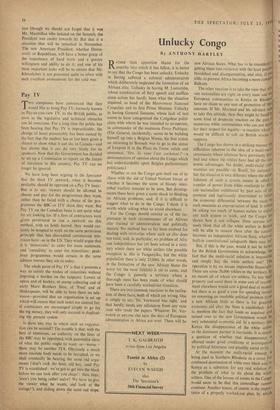Pay TV
rrwo companies have announced that they I would like to bring Pay TV, formerly known as Pay-as-you-view TV. to the British public, as soon as the legislative and technical obstacles can be overcome. For a long time the public has been hearing that Pay TV is impracticable; the change of heart presumably has been caused by the fact that the methoc has at last been given a chance to show what it can do, in Canada—and has shown that it car, do very nicely for its sponsors. Now that the Government has decided to set up a Commission to report on the future of television in this country, Pay TV can no longer be ignored.
We have long been arguing in the Spectator that the third TV network, when it becomes , available, should be operated on a Pay TV basis: that is to say, viewers should be allowed to choose and pay for the programmes they want, rather than be faced with a choice of the pro- grammes the BBC or ITV think they want. But Pay TV on the Canadian basis is not quite what we are looking for. If a firm of contractors were ,given permission to run a network on this method, with no holds barred, they would cer- tainly be tempted to work on the same pernicious principle that has discredited commercial tele- vision here—as in the US. They would argue that it is 'democratic' to cater for mass audiences, and 'unrealistic,' to eater for minorities: peak- hour programmes would remain in the same admass morass they are in today.
The whole point of Pay TV is that it presents a way to satisfy the wishes of minorities without imposing a burden on the taxpayer. Lovers of opera and of hockey, of stamp collecting and of early Marx Brothers films, of 'Fred' and of Shakespeare, will be able to have them on tele- vision—provided that an organisation is set up which will ensure that such tastes are catered for; if contractors are encouraged simply to go for the big money, they will only succeed in duplicat- ing the present system.
Is there any way in which such an organisa- tion can be secured? The trouble is that, with the best of intentions, an authority on the lines of the BBC may be appointed, with paternalist ideas of what the public ought to want; or—worse- there may be another ITA. Obviously a much more resolute body needs to be recruited, or we shall eventually be hearing the same old argu- ments ('don't rock the boat, old boy, until Pay TV is established: we've got to get into the black before we can look after you chaps': then, later, `aren't you being rather naïve? We have to give the viewer what he wants, and look at the ratings!'), and sliding down the same sad slope.






































 Previous page
Previous page